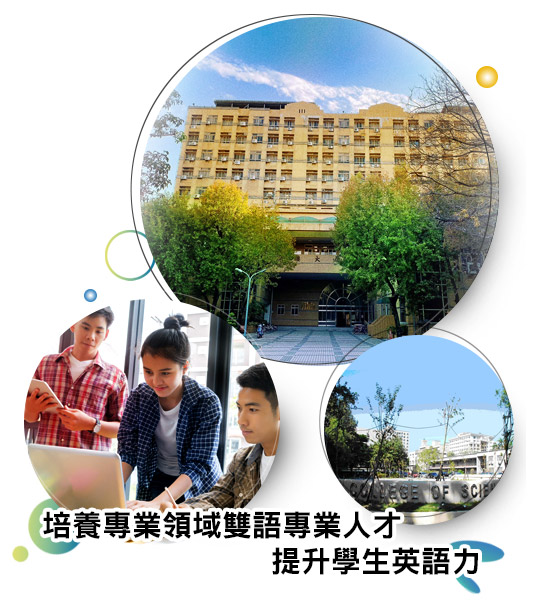關於EMI About 計畫緣起 Origin of the Program
2030雙語國家政策發展藍圖
 面對全球化及國際化浪潮,為提升國民英語力以增加國際競爭力,國發會遵循院長指示,以2030年為目標,打造臺灣成為雙語國家,召開跨部會協調會議,請各部會從需求端積極規劃民眾、產業及政府全面之雙語政策,以提升國人英語力為策略主軸,經跨部會研商並蒐集各界意見後,提出「2030雙語國家政策發展藍圖」。
面對全球化及國際化浪潮,為提升國民英語力以增加國際競爭力,國發會遵循院長指示,以2030年為目標,打造臺灣成為雙語國家,召開跨部會協調會議,請各部會從需求端積極規劃民眾、產業及政府全面之雙語政策,以提升國人英語力為策略主軸,經跨部會研商並蒐集各界意見後,提出「2030雙語國家政策發展藍圖」。
In the face of globalization and internationalization, in order to enhance the people's English ability and increase their international competitiveness, the National Development Council has followed the President's instructions and set the goal of creating a bilingual country by 2030. To convene a coordination meeting between the various ministries and commissions, and to invite the ministries to actively plan the comprehensive bilingual policies of the public, industry and government from the demand side, with the enhancement of the English language capability of the Chinese people as the strategic focus. Presentation of the "2030 Bilingual National Policy Roadmap".
本藍圖兩大目標為「提升國家競爭力」、「厚植國人英語力」,透過全面啟動教育體系的雙語活化、推動設立全英語電視臺頻道、鼓勵公廣集團製播英語節目、增加廣播電臺之英語節目、營造友善雙語觀光環境、政府採購文件雙語化、鼓勵促參案件雙語化、重大案件與涉在臺外國人或外商之起訴書提供英文摘要內容、建議司法院對重大判決摘要英譯等16項個別策略,以及推動各部會官網全面雙語化、與外國人相關文書及法規雙語化、公共服務場域第一線服務雙語化、落實政府公開資訊雙語化、推升文教場館之雙語服務、培育公務人員英語溝通力、全國技術士技能檢定考試及證照雙語化等8項共同策略,期能以需求驅動供給、最小成本創造最大效益等兩大原則,提升國人英語力,打造臺灣成為雙語國家。
The two main objectives of this blueprint are "enhancing the competitiveness of the country" and "enhancing the English language power of the Chinese people". Through the full-scale activation of the bilingual education system, the promotion of the establishment of all-English television channels, and the encouragement of the Public Group to make English programs. Increase the number of English programs on radio stations, create a friendly bilingual tourism environment, bilingualism in government procurement documents, encourage bilingualism in cases of promotion of participation, provide summaries in English of major cases and indictments involving foreigners or foreign businessmen in Taiwan, 16 individual strategies, including English translation of major judgments by the Judiciary Court, as well as the promotion of full bilingualism in the official website of various ministries, bilingualism in documents and regulations relating to foreigners, bilingualism in the first-line services of public services, bilingualism in the public information provided by the Government, The eight common strategies of promoting bilingual services in cultural and educational venues, fostering English communication among public servants, national skills testing and bilingual certification will be able to drive supply by demand and create maximum benefits at minimum cost. To enhance the English language skills of the people of Taiwan and build Taiwan into a bilingual country.
本藍圖與以往推動之雙語政策不同之處,在於本次係為提升國家整體競爭力,而非如以往以考試為目的;重視的是提升國人英語力,而非僅有硬體環境的建置;此次盼帶動全民學習英語的風氣,而非僅針對學生;而政府相關措施係以需求面出發,而非單純強調供給面。
This blueprint is different from the bilingual policies that have been promoted in the past, in that it is aimed at enhancing the overall competitiveness of the country, rather than at testing as in the past. What is important is to improve the English language power of the people of China, rather than to build a hardware environment. This time, it is hoped to promote the culture of learning English among the people. Not just students; government measures are demand-driven. Rather than simply emphasizing the supply side.
大專校院學生雙語化學習計畫
教育部「大專校院學生雙語化學習計畫」以「強化學生英語力,推動全英語授課(English as a Medium of Instruction,即EMI),整體提升高教國際競爭力」為願景,並分「重點培育計畫」(分學校型及學院型兩類)及「普及提升計畫」兩大主軸推動,計畫以2021年至2030年為期,分兩期推動,每期五年。
The Program on Bilingual Education for Students in College is to cultivate students’ English proficiency by launching English as a Medium of Instruction (EMI) program to elevate international competitiveness of higher education. The program is divided into two main aspects: Focused Development (universities and colleges) and Generalized Enhancement. The program will cover the period from 2021 to 2030 and be promoted into two phases with each phase five years.
本計畫擬透過計畫執行協助學校逐步推動全英語教學模式、發展教師全英語教學支持系統、引入具有國外全英語教學經驗之國際教學人員、建置全英語學習環境等措施,以學生為主體,培養學生英語能力,進而提高國際移動力並加值就業競爭力,教育部期許獲補助學校致力營造優質雙語學習環境,以重點培育養成專業領域雙語專業人才,本次獲重點培育補助之學校或學院應至少達成以下目標:
The program is planned to assist universities to progressively implement EMI courses, develop EMI support systems, recruit international teaching personnel for EMI courses, and establish English learning environment, etc., aiming to improve students’ English proficiency and strengthen Taiwan’s industrial competitiveness and international mobility. MOE hopes that the subsidized universities and colleges commit to create an excellent bilingual learning environment to cultivate professional bilingual talents. The subsidized universities and colleges for Focused Development shall at least achieve the following objectives:
-
2024年達到「25-20-20」:2024年時,標竿大學與標竿學院至少有25%的大二學生,其英文能力在聽說讀寫達到CEFR B2以上的流利精熟等級,同時全校至少有20%的大二學生與碩一學生,在其當年所修學分中的20%以上為全英語課程。
25-20-20 in 2024: In 2024, at least 25% of second-degree students in benchmark universities and benchmarking colleges were fluent in English, above the CEFR B2 level, when they heard, read, and write. At the same time, at least 20 percent of the students in the school were students of the second year and of the first year of master’s, with more than 20 percent of the credits they took in that year being EMI courses.
-
2030年達成「50-50-50」:2030年時,標竿大學與標竿學院中至少有50%的大二學生在聽說讀寫達到CEFR B2以上的流利精熟程度,同時至少有50%的大二學生與碩士學生其當年學分中的50%以上為全英語課程,並推動畢業證書EMI修課認證,以接軌國際及產業。
50-50-50 by 2030: By 2030, at least 50% of the second-degree students in benchmark universities and benchmarking colleges will be fluent in listening, speaking, reading and writing above CEFR B2. At the same time, at least 50% of the second-year students and master's degree students will have more than 50% of their credits in that year from EMI courses, and EMI course certification will be promoted in graduation diplomas to align with international and industry standards.